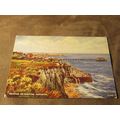Hamilton, Bermuda - The Session House Parliament 1970s
- Skick : Begagnad
- Frakt : 2 dagar
- Märke : Inga
- ID# : 33021115
- Antal : 1 produkt
- Visningar : 785
- Plats : Storbritannien

- Säljare : justthebook (+1712)
- Streckkod : Inga
- Start : Sön 24 Okt 2010 20:51:09 (CEST)
- Stängning : Pågår till såld
- Tid kvar : Pågår tills såld
Check
 för 1 föremål ändra
för 1 föremål ändra
Frakt Räknare
Mer annonser från denna säljare se alla
Säljarens Beskrivning
- Postcard
- Picture / Image: The Session House, Hamilton Bermuda
- Publisher: Bermuda General Agency
- Postally used: no
- Stamp: n/a
- Postmark(s): n/a
- Sent to: n/a
- Notes & Key words: has a small amount of paper adhering but otherwise nearly as new
------------------------------------------------
Postage & Packing:
UK (incl. IOM, CI & BFPO): 99p
Europe: £1.60
Rest of world (inc. USA etc): £2.75
No additional charges for more than one postcard. You can buy as many postcards from me as you like and you will just pay the fee above once. (If buying postcards with other things such as books, please contact or wait for invoice before paying).
Payment Methods:
UK - PayPal, Cheque (from UK bank) or postal order
Outside UK: PayPal or Google Checkout ONLY please. NO non-UK currency checks or money orders (sorry).
NOTE: All postcards are sent in brand new stiffened envelopes which I have bought for the task. These are specially made to protect postcards and you may be able to re-use them. In addition there are other costs to sending so the above charge is not just for the stamp!
----------------------------------------------
Text from the free encyclopedia WIKIPEDIA may appear below to give a little background information:
*************
The House of Assembly is the lower house of the Parliament of Bermuda. The house has 36 members, each elected for a five year term in a single seat constituencies.
The House of Assembly was originally the only house of Bermuda's parliament, and held its first session in 1620. It first met in Saint Peter's Church, in the original colonial capital, Saint George's, until its own building, the State House, was completed, also in 1620. It met in the State House until the capital was moved to Hamilton in 1815.
The House of Assembly was created at a time when Bermuda, or The Somers Isles, was administered by the Somers Isles Company (1615-1684), an offshoot of the Virginia Company. The House of Burgesses had been created in Virginia in 1619. It was overseen by a Governor appointed by the Company (from 1684, by the Crown), although, for much of the colony's history, the real political power lay with the appointed Privy council, or Governor's Council, composed of members of Bermuda's wealthy merchant class. During periods when the colony was without a Governor, the President of the Council might find himself Acting Governor, also. The balance of power began to shift away from the Council in the 19th Century, when Bermuda assumed a new importance in Imperial security, and when the Governor became also the Commander in Chief of the naval establishment and military garrison. Following revisions made to Bermuda's parliamentary system in the 1960s, the two roles once performed by the dissolved Council are now performed by an appointed upper house, the Senate, and a Cabinet, which is composed of Ministers appointed from elected Members of Parliament from the House of Assembly.
This was only one of the changes made in the 1960s, largely as a result of the civil rights movement. A constitution was introduced which made Bermuda's parliamentary system more like the Westminster system. Political parties were legalised, and the system of a majority Government, from which a Premier was appointed and the Cabinet Ministers were drawn, and a minority Opposition was adopted. The Senate was created to perform a function akin to that of the House of Lords, in London, although its members were appointed, rather than being hereditary, noble peers. The system of suffrage, by which the members of the lower house were elected, and which, as in Britain, had historically been limited to male landowners, was finally extended to all adults: universal adult suffrage. Although non-white males had not been specifically banned from either voting or standing for election, the land-owning requirement had effectively barred all but a few from voting. When the numbers of non-white land owners had increased, a minimum property value was added. The first non-white to stand for election was schoolmaster Augustus Swan, who owned two houses and dry goods stores in Hamilton and Flatts. He was part of a coalition that pledged black support for white candidates Samuel Nash, Ambrose Gosling and RJP Darrell, in exchange for white support of Swan, but the plan failed and none of these candidates won a seat. The first non-white person to actually gain a seat in the House of Assembly was William Henry Thomas Joell, elected MCP for Pembroke in May, 1883, and who died in 1886 while still holding his seat. He was replaced by John Henry Thomas Jackson, who was also non-white. Bermuda's women were denied the vote, and the ability to stand for election, entirely until 1944.
Further changes to the Parliamentary system in 1976 saw the vote restricted to Bermudians, whether Bermudian by birth or by granting of status, although other British and Commonwealth citizens who were registered to vote before that date remain enfranchised. In the 1980s, the voting age was lowered from 21 to 18 years of age.
Annonsinformation
| Annonstyp | Galleriannons |
| Annons-ID#: | 33021115 |
| Starttid | Sön 24 Okt 2010 20:51:09 (CEST) |
| Sluttid | Pågår till såld |
| Startbud | Fast pris (ingen budgivning) |
| Produktvillkor | Begagnad |
| Bud | 0 |
| Visningar | 785 |
| Avsändningstid (inkluderar inte söndagar) | 2 dagar |
| Antal | 1 |
| Plats | Storbritannien |
| Auto-förläng | Nej |





















